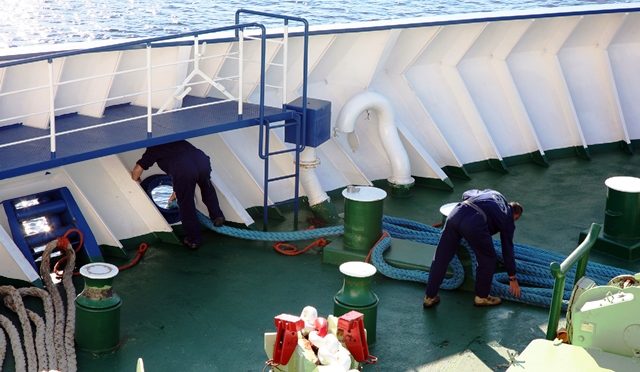Procedures can be adequate for many jobs carried out onboard, but others require extra care due to the risks involved. Frequently, fatalities or serious injury to seafarers – or environmental, ship or cargo incidents – are caused by failing to use the Permit to Work system, or the requirements have been ignored or misunderstood when the permit has been issued. The London P&I Club has launched new LP Focus issue to address all issues related to permits to work .
A Permit to Work should be a simple formal system stating exactly what work is to be done, when it is being done and the safety controls that must be put in place to avoid injury or death. Permits are also a means of communication between those who carry out the work, the person responsible for their safety and someone who could introduce a hazard if they were unaware the work was taking place. It can also coordinate different work activities to avoid conflicts.
However, issuing a permit does not by itself, make a task safe. That can only be achieved by the thoroughness of those preparing, supervising and carrying out the work. Permits to Work come in different forms. All companies should prepare a format that is suitable for their ships, and their crews should be trained to use the permit system.
When should a permit be used?
Wherever there is a high-risk job taking place, a written Permit to Work procedure should always be used. Jobs considered to be high risk should include:
- Entry into enclosed or confined spaces
- Working on machinery or equipment which can start automatically or requires isolation
- Hot work including welding
- Working aloft or overside
- General electrical work (Under 1000 Volts)
- Electrical high voltage work (Over 1000 Volts)
- Working on lift machinery
Additional Permits to Work may be required depending on the trade of the ship and the work carried out. Permits can be individual or cover a number of work types.
What should a Permit to Work system cover? The following should be taken into account in a good system:
- Human factors
- Management of the work permit systems
- Poorly-skilled work force
- Unconscious and conscious incompetence
- Objectives of the work permit system
- Types of work permits required
- Contents of the work permits
When does a Permit to Work fail?
Accident investigations generally find that the ship’s Permit to Work system has been utilised and a permit completed, but an accident has still happened. The most common reasons for this are:
- Wrong type of work permit used, resulting in the hazards and precautions required not being identified
- Incorrect information about work to be carried out and precautions not identified
- Failure to recognise the hazards where work is carried out (e.g. flammable substances)
- Introduction of ignition source in controlled flameproof area (e.g. welding, non-spark-proof tools, non-intrinsically safe equipment used in intrinsically safe zones)
- Terms of work on the permit not adhered to, despite having been identified (e.g. failure to isolate plant and/or drain lines of hazardous substances)
- Unauthorised staff performing work permit functions
- Permit system completed incorrectly or without sufficient thought (a tick-box mentality)
- Insufficient monitoring of the work permit system (e.g. permit out of date/time)
- Permit to work issued for too long a period of time allowing circumstances to change
- Prescribed permit is complicated and not properly understood
Considerations when completing a Permit to Work
- Whether staff have been instructed, trained and are properly supervised
- Whether the permit includes sufficient safety information, maintenance instructions, correct PPE and equipment for use
- Whether the work permit contains sufficient information about the type of work and the environment being worked in
- That the work is properly authorised by a responsible person
- Human factors (stress, fatigue, shift work, attitude)
- Whether sufficient precautions are taken prior to initiating a work permit (isolation, draining, flushing, environmental monitoring, risk assessments, communication, time allotted for the work)
- Whether the person responsible is aware of the type of maintenance involved and how long it is likely to take
- Whether the work permit system involves a formal procedure of any maintained equipment being handed back to operation
- Whether all hazards have been considered
- That all personnel are aware of the permit being issued (e.g. Bridge, Cargo room, Engine Control Room)
Company responsibilities
Shipping companies should ensure that they have in place a robust and easy-to-use Permit to Work system which is relevant to the ship. They should ensure that everyone involved in the system has been properly trained in its use and how to complete it. When visiting the ships and conducting audits, the Permit to Work system should be reviewed to ensure that it is being properly managed, and that permits are actually being used, are correctly completed and are effective. Crew should be interviewed to ensure they understand the system and whether they have any suggestions for improvement.
• Always use a Permit to Work when the job requires it
• Complete it correctly
• Think carefully when you are completing it
• Make sure it is in date and time
• Remember it could save your life or the lives of those you are responsible for
For further details you may read the LP Focus issued by the London P&I Club
Source: London P&I Club
































































Is there any requirement about how long permit to work records should be kept archived? I found only 30 days requirement for the petroleum industry and allied industries (HSE.GOV.UK).